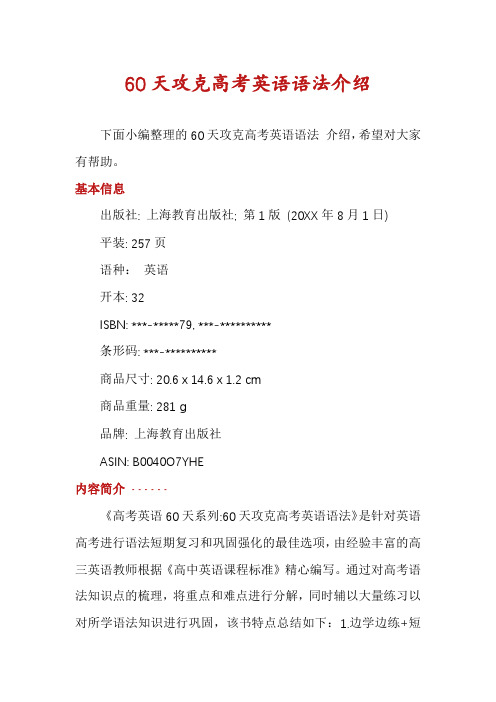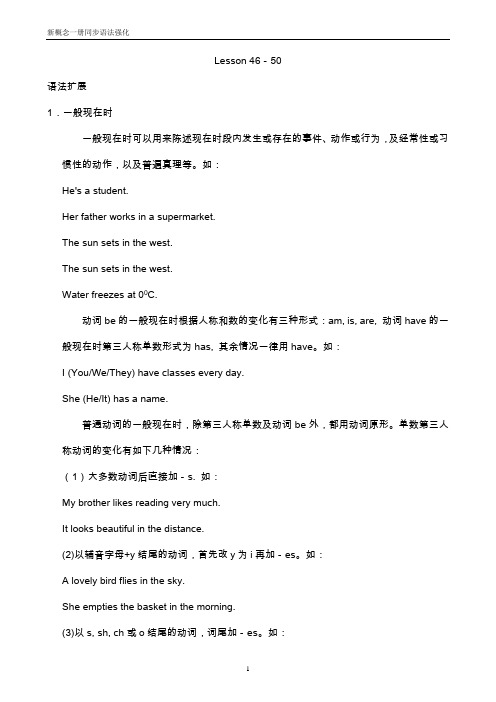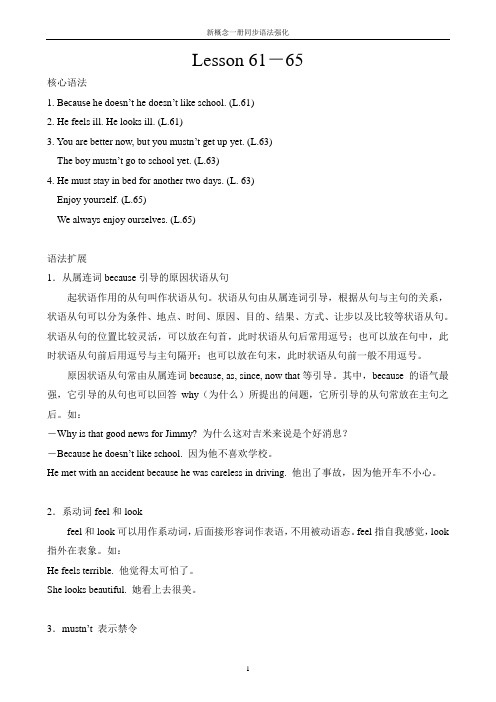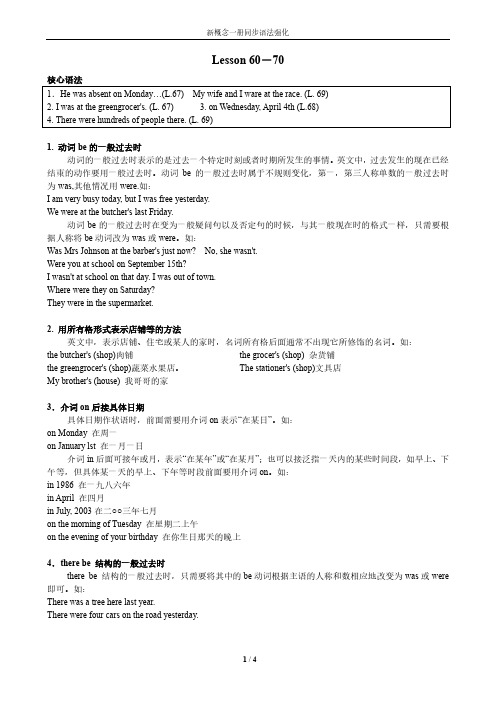同步语法强化56-60
- 格式:doc
- 大小:30.00 KB
- 文档页数:4

60天攻克高考英语语法介绍下面小编整理的60天攻克高考英语语法介绍,希望对大家有帮助。
基本信息出版社: 上海教育出版社; 第1版(20XX年8月1日)平装: 257页语种:英语开本: 32ISBN: ***-*****79, ***-**********条形码: ***-**********商品尺寸: 20.6 x 14.6 x 1.2 cm商品重量: 281 g品牌: 上海教育出版社ASIN: B0040O7YHE内容简介· · · · · ·《高考英语60天系列:60天攻克高考英语语法》是针对英语高考进行语法短期复习和巩固强化的最佳选项,由经验丰富的高三英语教师根据《高中英语课程标准》精心编写。
通过对高考语法知识点的梳理,将重点和难点进行分解,同时辅以大量练习以对所学语法知识进行巩固,该书特点总结如下:1.边学边练+短期突破:对课程标准范围内的语法点进行系统汇总,并对知识点进行精辟独到的讲解,每个知识点都配有相应的练习题目,边讲解边练习,这样不仅可以及时检测对讲解内容的理解,还可以加深对知识点的印象。
每天两页练习题量,共计两个月的复习时间,只要按照计划进行复习,即可攻克高考英语语法。
2.海量真题+模拟练习:紧跟知识点讲解之后的是“即学即练”和“大练兵”,这两部分是由大量高考真题和精选模拟练习组成,同学们可以趁热打铁,对所学知识点进行反复演练,将知识点进一步巩固和强化。
最后还附上十五套综合模拟题,让同学们通过沉着练习,最终做到轻松应对。
3.散点式讲解+直击考点:不同于刻板的语法教材讲解,《高考英语60天系列:60天攻克高考英语语法》内语法知识点采用老师课堂上的散点式讲解,剔除了传统语法书中繁冗的赘述,将考点、难点、易错知识点一一呈现,不仅可以节省大量的宝贵时间,还可以使复习达到事半功倍的效果。
语法是构建语言的框架和基础,语法知识体现在高考的每一个题型中,因此,对语法知识进行系统的汇总梳理是非常有必要的,《高考英语60天系列:60天攻克高考英语语法》精心编排的语法知识和海量练习题目一定会成为同学们复习的有力助手,帮助同学们取得理想的英语高考成绩!目录第1天构词法第2天构词法大练兵第3天名词第4天数词第5天代词第6天代词大练兵第7天冠词第8天形容词第9天副词第10天形容词副词比较等级第11天比较等级大练兵第12天介词第13天介词大练兵第14天连词第15天动词第16天动词短语大练兵第17天助动词第18天情态动词第19天情态动词大练兵第20天动词的时态第21天动词时态大练兵第22天动词的语态第24天虚拟语气大练兵第25天动词不定式第26天动词不定式大练兵第27天动名词第28天非谓语分词(1)第29天非谓语分词(2)第30天非谓语分词大练兵第31天析使句和感叹句第32天反意疑问句第33天主语从句第34天宾语从句第35天定语从句第36天定语从句大练兵第37天状语从句第38天状语从句大练兵第39天独立成分第40天倒装第41天倒装大练兵第42天省略第43天主谓一致第45天特殊句式第46天语法深呼吸(1) 第47天语法深呼吸(2) 第48天语法深呼吸(3) 第49天语法深呼吸(4) 第50天语法深呼吸(5) 第51天语法沉着练(1) 第52天语法沉着练(2) 第53天语法沉着练(3) 第54天语法沉着练(4) 第55天语法沉着练(5) 第56天语法放轻松(1) 第57天语法放轻松(2) 第58天语法放轻松(3) 第59天语法放轻松(4) 第60天语法放轻松(5) 参考答案。

新概念一册同步语法强化Lesson60-70Lesson 60-70核心语法1.He was absent on Monday…(L.67)My wife and I ware at the race. (L. 69)2. I was at the greengrocer's. (L. 67)3. on Wednesday, April 4th (L.68)4. There were hundreds of people there. (L. 69)1. 动词be的一般过去时动词的一般过去时表示的是过去一个特定时刻或者时期所发生的事情。
英文中,过去发生的现在已经结束的动作要用一般过去时。
动词be的一般过去时属于不规则变化,第一,第三人称单数的一般过去时为was,其他情况用were.如:I am very busy today, but I was free yesterday.We were at the butcher's last Friday.动词be的一般过去时在变为一般疑问句以及否定句的时候,与其一般现在时的格式一样,只需要根据人称将be动词改为was或were。
如:Was Mrs Johnson at the barber's just now? No, she wasn't.Were you at school on September 15th?I wasn't at school on that day. I was out of town.Where were they on Saturday?They were in the supermarket.2. 用所有格形式表示店铺等的方法英文中,表示店铺、住宅或某人的家时,名词所有格后面通常不出现它所修饰的名词。
如:the butcher's (shop)肉铺the grocer's (shop) 杂货铺the greengrocer's (shop)蔬菜水果店。

Lesson 46-50语法扩展1.一般现在时一般现在时可以用来陈述现在时段内发生或存在的事件、动作或行为,及经常性或习惯性的动作,以及普遍真理等。
如:He's a student.Her father works in a supermarket.The sun sets in the west.The sun sets in the west.Water freezes at 00C.动词be的一般现在时根据人称和数的变化有三种形式:am, is, are, 动词have的一般现在时第三人称单数形式为has, 其余情况一律用have。
如:I (You/We/They) have classes every day.She (He/It) has a name.普通动词的一般现在时,除第三人称单数及动词be外,都用动词原形。
单数第三人称动词的变化有如下几种情况:(1)大多数动词后直接加-s. 如:My brother likes reading very much.It looks beautiful in the distance.(2)以辅音字母+y结尾的动词,首先改y为i再加-es。
如:A lovely bird flies in the sky.She empties the basket in the morning.(3)以s, sh, ch或o结尾的动词,词尾加-es。
如:He misses you very much.Jennifer washes clothes every day.He watches TV every weekend.用一般现在时的行为动词组成的陈述句变为疑问句时,借助于具动词do或does(用于第三人称单数)。
形式为:Do/Does+主语+动词原形。
如:Do you like coffee?Does she speak Chinese?动词have表示“有”的含义时,既可以借助助动词do/does,也可以不借助,而自身起到助动词的作用,构成疑问句和否定句。

Lesson 61-65核心语法1. Because he doesn’t he doesn’t like school. (L.61)2. He feels ill. He looks ill. (L.61)3. You are better now, but you mustn’t get up yet. (L.63)The boy mustn’t go to school yet. (L.63)4. He must stay in bed for another two days. (L. 63)Enjoy yourself. (L.65)We always enjoy ourselves. (L.65)语法扩展1.从属连词because引导的原因状语从句起状语作用的从句叫作状语从句。
状语从句由从属连词引导,根据从句与主句的关系,状语从句可以分为条件、地点、时间、原因、目的、结果、方式、让步以及比较等状语从句。
状语从句的位置比较灵活,可以放在句首,此时状语从句后常用逗号;也可以放在句中,此时状语从句前后用逗号与主句隔开;也可以放在句末,此时状语从句前一般不用逗号。
原因状语从句常由从属连词because, as, since, now that等引导。
其中,because 的语气最强,它引导的从句也可以回答why(为什么)所提出的问题,它所引导的从句常放在主句之后。
如:-Why is that good news for Jimmy? 为什么这对吉米来说是个好消息?-Because he doesn’t like school. 因为他不喜欢学校。
He met with an accident because he was careless in driving. 他出了事故,因为他开车不小心。
2.系动词feel和lookfeel和look可以用作系动词,后面接形容词作表语,不用被动语态。
feel指自我感觉,look 指外在表象。

Lesson 60-701. 动词be的一般过去时动词的一般过去时表示的是过去一个特定时刻或者时期所发生的事情。
英文中,过去发生的现在已经结束的动作要用一般过去时。
动词be的一般过去时属于不规则变化,第一,第三人称单数的一般过去时为was,其他情况用were.如:I am very busy today, but I was free yesterday.We were at the butcher's last Friday.动词be的一般过去时在变为一般疑问句以及否定句的时候,与其一般现在时的格式一样,只需要根据人称将be动词改为was或were。
如:Was Mrs Johnson at the barber's just now? No, she wasn't.Were you at school on September 15th?I wasn't at school on that day. I was out of town.Where were they on Saturday?They were in the supermarket.2. 用所有格形式表示店铺等的方法英文中,表示店铺、住宅或某人的家时,名词所有格后面通常不出现它所修饰的名词。
如:the butcher's (shop)肉铺the grocer's (shop) 杂货铺the greengrocer's (shop)蔬菜水果店。
The stationer's (shop)文具店My brother's (house) 我哥哥的家3.介词on后接具体日期具体日期作状语时,前面需要用介词on表示“在某日”。
如:on Monday 在周一on January lst 在一月一日介词in后面可接年或月,表示“在某年”或“在某月”;也可以接泛指一天内的某些时间段,如早上、下午等,但具体某一天的早上、下年等时段前面要用介词on。

语法填空名校模拟真题强化练12(2024秋·甘肃天水·高三统考一模)阅读下面短文,在空白处填入1个适当的单词或括号内单词的正确形(open) a martial arts school in China or in the US, to teach more people around the world about real martial arts and traditional Chinese culture, and to become 20 bridge between cultures.(2023秋·湖南·高三校联考开学考试)阅读下面短文,在空白处填入1个适当的单词或括号内单词的正确形式。
The Silk RoadThe Silk Road was one of the most important arteries (干线) of trade and culture in the world history. 21 planes and trains brought our world close together, it was the first link that ever connected the East and the West 22 the life blood of international trade in ancient time. Many merchants (商人) have traveled on this route between China and Mediterranean bank area for more than 2, 000 years. The trading activity has brought culture exchange, religions spreading and contrasts to the connected 23 (region) and formed a remarkable culture tie featured by Asian, European and the Mediterranean bank.Starting from the ancient China capital city Chang’an (Xi’an at present), it stretched more than 7,000 kilometres, 24 (reach) the Mediterranean bank. The route was firstly created by an envoy called Zhang Qian assigned by the king of Han Dynasty to deliver gifts 25 was mainly silk for those local loads in west China area 26 (hold) their loyalty. Since the Chinese highly qualified silk 27 (make) its fame to the western countries, the merchants sought the opportunity of trading Chinese silk along this route and gained a great fortune.Few people would 28 (real) finish the whole silk route journey, because they just traded certain local crafts such as silk, blanket and carpet, etc. with other merchants. Many people took part and numerous goods 29 (trade) in the great international trade at that time. The main cities 30 the Silk Road had grown larger and more important in helping the trade and merchants.(2023秋·河南·高三校联考一模)阅读下面短文,在空白处填入1个适当的单词或括号内单词的正确形式。
语法填空名校模拟真题强化练59(23·24高三下·湖南·阶段练习)阅读下面短文,在空白处填入1个适当的单词或括号内单词的正确形式。
Statistics show that there are more than 1. 9 billion videos related to stove-boiled tea on a popular Chinese short video platform. Stove-boiled tea, a newly 1 (emerge) social activity among young Chinese people, has been filling up social media feeds in recent weeks. Usually several friends sitting around a fire stove enjoy 2 smell of charcoal-grilled snacks and socialize while waiting for the tea 3 (boil). In many ways, it is the perfect activity in the winter, 4 (warm) body and soul in the colder months.5 it has recently regained popularity, cooking tea on a stove actually has a long history in China. Stove-boiled tea is derived from an intangible cultural heritage from southwest China’s Yunnan province: huotang roasted tea and a kind of huotang culture thus6 (form) around it.The reason why stove-boiled tea is gaining such popularity, apart from its embodiment of traditional Chinese tea culture, is 7 (part) because of its portrayal in the costume television drama “A Dream of Splendor”, which 8 (broadcast) last summer. The activity also shows young people’s pursuit of a sense of ritual, with their 9 (long) for traditional tea culture and aspirations returning to the pastoral (田园). It also helps that tourism is gradually recovering. 10 , stove-boiled tea acts as a social way of combining ancient and modern elements, attracting many young people who love both tourism and traditional tea culture.(23·24高三下·重庆渝北·阶段练习)阅读下面短文, 在空白处填入1个适当的单词或括号内单词的正确形式。
Lesson59 Is that all?一、单词分类;二、课文复习三、课文重点四、词组五、语法解析1.时间表达法整点时用o’clock正读法:时+ 分倒读法:分+ past/to + 时30分half 15分 a quarter past 过to 缺分钟数小于等于30分时,用past分钟数大于30分时,用to练习:1.twelve thirty 12:302.four o’clock 4:003.six two 6:204.one past two 2:015. a quarter past eleven 11:156.half past five 5:307.two to two 1:588.five to ten 9:559.ten past ten 10:1010.one to nine 8:592.一现&现进练习:1. My brother can make (make) cakes.2. There is (be) some tea in the shop.3. Does your sister do (do) her homework every day?4. It is 12 o’clock now. Is your mother cooking (cook) lunch?5. What does (do) he do (do) in the evening?6. What is your brother doing (do) at three in the afternoon?7. My mother works (work) in a hospital. Where does your mother work (work)?8. Don’t speak (speak) to your mother like that!9. Let me look (look) at your photos!10. My wife is making (make) tea for my son at the moment.11. What are you doing (do) now?12. Gino is very kind, he always helps (help) me.3. have 有,后跟名词单三形式has ,助动词为:do/does否定句和一般疑问句句中some变anyI have some water.否:I don’t have any water. 一疑:Do you have any water? 答:Yes, I do. / No, I don’t. 特:What do you have? She has some apples.否:She doesn’t have any apples.一疑:Does she have any apples?答:Yes, she does. / No, she doesn’t. 特:What does she have?六、单词练习1.I want to write a letter to my friend, so I need a writing paper and an e nvelope .2.Marry works in a shop,she is a shop a ssistant .3.These shoes are small, can you give me a large s ize .4.The teacher uses a piece of c halk to write on the blackboard.5.Do you have any g lue ? My paper is broken.七、语法练习1.根据需要为以下句子中的名词加上-s或-es,或保持原形I don’t have any banana, but I have some peach.I don’t have any bananas, but I have some peaches.I don’t have any coffee, but I have some milk.I don’t have any coffee, but I have some milk.1.I don’t have grape, but I have some peach.I don’t have grapes , but I have some peaches .2.I don’t have any tomato, but I have some potato.I don’t have any tomatoes , but I have some potatoes .3.I don’t have any mince, but I have some steak.I don’t have any mince , but I have some steak .4.I don’t have any glue, but I have some ink.I don’t have any glue , but I have some ink .5.I don’t have any envelope, but I have some writing paper.I don’t have any envelopes , but I have some writing paper .2.模仿例句提问并回答Do you have any butter? /cheeseI don’t have any butter, but I have some cheese.Do you have any honey? /jamI don’t have any honey, but I have some jam.Do you and Penny have any beans? /peasWe don’t have any beans, but we have some peas.3.按要求写出下列形式。
同步语法强化61-65同步语法强化Lesson 61-651.从属连词because引导的原因状语从句。
2.系动词feel和look3.mustn't表示禁令4.介词for连接表示一段的时间作状语5.反身代词一.选择填空。
1.What's the matter Tim?A.aboutB.ofC.toD.with2.He ill.He a headache.A.feel;haveB.feels;hasC.feels;haveD.feel;has3.You have a bad cold,so you must stay bed a few days.A.in;atB.on;inC.in;forD.on;for4.It's really a good news us.A.forB.atC.withD.to5.He has an earache.He must the doctor.A.visitB.watchC.takeD.see6.You look ill.You must the doctor.A.haveB.callC.callingD.take7.George has a stomach ache.He must an aspirin.A.takeB.drinkC.eatD.make8.Mum has flu.Please the room warm.A.makeB.keepC.keepingD.making9.This is the key my room.A.onB.ofC.forD.to10.Don't lean the window,boys!It's dangerous!A.atB.outC.ofD.out of二.改错题。
1.You must are home before ten o'clock.2.We always enjoy myself.3.Mother tells Sam,"You mustn't play matches!"4.Jimmy doesn't like go to school.5.I'm going to see him on ten o'clock.6.It often rains at November.7.Father is sleeping.Don't make noise!8.Don't drive so quick.It's dangerous.9.Mary looks well.She is good now.10.You are ill.You must remaining in bed.三.用所给单词的适当形式填空。
高考英语语法填空强化含答案5篇1.The artists of Dafen can paint like Van GoghThe village of Dafen was once thought 56 (produce) the most oil paintings in the world every year. 57 (recognize) as the ”world’s art factory“, Dafen impressed visitors with its many workshops, in which painters created mock masterpieces by Van Gogh, Monet and Warhol. But the village was always seen more as a production line 58 a place of culture. Today the future of Dafen may depend on 59 it is able to earn respect of the art world.Things started to change for Dafen in 2008, 60 the global financial crisis cut down overseas orders. With more demand 61 (come) from domestic market, artists began painting different subjects. New customers preferred Chinese styles, says 62 painter in Dafen. He learnt the art of Shan Shui which involves representing natural landscapes. In some ways Dafen reflected the broader economy. As exports starts to decline as a share of GDP, domestic consumption plays a larger role in the 63 (grow).China is the world’s second-largest art market, 64 it is not clear where Dafen fits in. Li Jinghu, an artist from nearby Dongguan, often visits the village hoping to discover new talent. But locals say the demand for their paintings 65 (decline) in the past two pandemic-struck years. ” Most people would probably be surprised that Dafen still exists. It does and it will, “ says Lisa Movius, a writer in Shanghai who covers art.56.to produce57.Recognized 58.than59.whether60.whening62.a63.growth64.but65.has declined2.阅读下面短文,在空白处填入一个适当的单词或括号内单词的正确形式。
同步语法强化Lesson 56-60
1.具体时刻的表示方法。
2.介词by
3.完全动词have
一.用英语写出下列时刻。
1.上午七点整
2.中午十二点
3.早上五点半
4.下午五点一刻
5.差十分六点
6.五点过两分
7.三点二十五8.四点三十八
9.十二点差一刻10.五点零五分
11.九点十分12.十一点零六分
二.选择填空。
1.The children go to school bus.
A.on
B.in
C.by
D.with
2.I have four and two .
A.tomatoes;photos
B.tomato;photoes
C.tomatoes;photoes
D.tomatoes;photo
3.A man has two arms and two .
A.foot
B.foots
C. feets
D.feet
4.We have only four classes Friday.
A.in
B.on
C.at
D.by
5.This is my handbag,and that is .
A.he
B.him
C.his
D.himself
6.- is my skirt?-It's behind the door.
A.Where
B.What
C.Whose
D.Which
7.The teacher's name is John Henry Brown.His students call him .
A.Mr. Brown
B.Mr. John
C.Mr. Henry
D.Mrs. Brown
8.I don't have ink.
A.some
B.any
C.little
D.few
9.We often newspapers in the morning.
A.read
B.look
C.see
D.watch
10.I have two apples. of them are on the table.
A.All
B.One
C.Both
D.Each
三.改错题。
1.He usually watches TV at the night.
2.Simon goes to school by foot every morning.
3.Tom does his homework at the moment.
4.What others do you want?
5.The children are go to school by bike.
6.In this morning,father goes to work by bus.
7.Do you have some milk,please?
8.Please give me my changes.
9.I want to buy a large box of chalks.
10.It's ten to nine o'clock.
四.用所给词的适当形式填空。
1.Look!A little girl is (swim)in the river.
2.Do you like (watch)TV?
3.It's eight o'clock.The students are (have)an English lesson.
4. they often (make)cakes?
5.Where Zhou Nan (teach)?She (teach)in No. 2 Middle School.
6.Her friend in Beijing?
7. (be) the girls from the United States?
8.Li Ping (not watch) TV at home now.
9.Rebecca (come)from the United Kingdom.
10.-What he (do)every morning?
-He (watch)TV every evening.
五.按要求转换句型。
1.It is a quarter past five now. (对划线部分提问)
2.I know what time it is. (改为一般疑问句)
3.I have some small pads of writing paper. (改为否定句)
4.It's often windy in March. (就划线部分提问)
5.It is very cold in winter. (改为一般疑问句)
6.I'm going to write a book about our students. (改为现在进行时)
7.Do you like winter?Do you like summer?(合并为选择疑问句)
8.I like summer best. (就划线部分提问)
六.完形填空。
A:Where are the students now?
B:They are 1 .They 2 an English lesson.
A:Do they have 3 English lesson at this time every day?
B: 4 . Except(除......以外)on Friday.
A: 5 teaching them English?
B:Miss Green.
A:Let's walk over to see what they are 6 now. Who's standing 7 the blackboard?
B:It's Luck.She's 8 something on the blackboard.
A:Is the young woman by the window 9 English teacher,Miss Green.
B:Yes,she's new teacher from England,and she 10 well.
A:What's she doing now?
B:She's asking the students questions.
()1.A.in the classroom B.in the open air C.on the playground D.in the fields ()2.A. Have B.are giving C.are working D.are having ()3.A.the B. a C. an D.any
()4.A.Ok B.Oh,no C. Yes D.I don't know ()5.A.Who's B.What's C.Is Miss Green D.Is Mrs Green ()6.A.do B. does C.doing D.did
()7.A. on B.at C. in front of D.at the front of ()8.A. speaking B.writing C. looking D.seeing
()9.A.a B.an C. also D. the
()10.A.teaches B.studies C.makes D.plays
七.汉译英。
1.星期天他有时候步行去城里。
2.我们通常七点钟吃早饭。
3.我的女儿准备下午四点钟去公园玩。
4.汤姆通常每天晚上看电视,但是今晚他准备听收音机。
5.每天早上八点钟孩子们在做什么?
6.你还有别的事要做吗?
7.我妻子正在给我做晚饭。
8.小张的爸爸打算明天到花园里浇花。